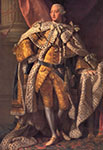Georg Wilhelm Friedrich
|
 |
George III. of Great Britain, elector of Hanover, and from 1814/15, king of Hanover in the sphere of his family. Already at the age of 22, George III. had become king of Great Britain and elector of Hanover. He was the first Hanoverian ruler to be born in Britain, and he spoke fluent English from the beginning. He became popular among many Englishmen who had considered his predecessors as nothing more than foreign intruders. He was the son of Friedrich Ludwig (1707-1751), Prince of Wales, and ascended the throne in 1760 upon the death of his grandfather, Georg II. August (1683-1760). After his father's death in 1751, he had been educated in isolation from the fashionable world under the care of his mother and her favorite counselor the earl of Bute. He was taught to revere the maxims of Bollingbroke's "Patriot King" and to believe that it was his appointed task to break the power of the Whig houses, which rested upon property and the influence of patronage and corruption. During his 60-year reign he never visited the Electorate of Hanover. He aided his motherland chiefly in agricultural matters. Moreover, he had his six younger sons educated in Hanover. In 1763 he appointed his brother-in-law, duke Karl of Mecklenberg-Strelitz, to be general governor of the Electorate of Hanover. Due to the absence of the ruler, however, the Electorate was essentially ruled by counselors from a few aristocratic families.
Under the command of George III., Great Britain rose to world power. From 1763-1783, the American colonies belonged to the British crown, but they won their independence during the reign of king George III, who had vigorously resisted making any major concessions to the colonists. But when the treaty with the United States was concluded on 3 September 1783, king George III. addressed the American minister, John Adams:
"Sir, I wish you to believe, and that it may be understood in America, that I have done nothing in the late contest but what I thought myself indispensably bound to do by the duty which I owed to my people. I will be very frank with you. I was the last to consent to the separation: but the separation having been made and having become inevitable, I have always said, as I say now, that I would be the first to meet the friendship of the United States as an independent power." [as quoted in the Encyclopædia Britannica 13th edition, vol. 11, p. 741]
King George III. was, like his long-time prime minister William Pitt the Younger (1759-1806), an opponent of revolutionary and Napoleonic France.
In old age king George III. suffered from porphyria, a metabolic disorder that causes mental disturbances. The disease flared up briefly in 1765 when plans for a regency council were made. For several months in 1788-1789, George III.'s illness became quite severe, and a regency was again considered. But the king recovered in February 1789, and thereby vanished the hopes for a regency by the profligate prince of Wales, the future king George IV. (1762-1830). In 1811, after the death of his favorite child, the Princess Amalia, George III.'s mind began to descend irretrievably into insanity, and he was afflicted with deafness and blindness. So at long last the prince of Wales became prince regent until he succeeded as George IV. Still, king George III. survived the advancement of Hanover to kingdom in 1814/15; but from 1811 until his death on 20 January 1820 he survived only in insanity and blindness.
On 8 September 1761, George III. had married Charlotte Sophia (1744-1818), princess of Mecklenburg-Strelitz, with whom he had fifteen children, including nine sons. After a happy married life, the queen died at Kew on 17 November 1818.
--Adapted from the website, Die Welfen
![]()
Sources
- Encyclopædia Britannica, 13th edition. New York: The Encyclopædia Britannica, Inc., 1926.
- Heil unserm König. Historisches Museum. Hanover, 1995.
Web





